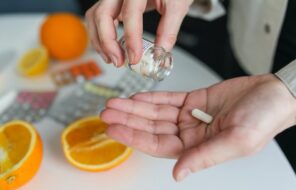If you look back at ads from the ‘50s and ‘60s, you’ll find plenty that promoted the health benefits of sugar — yes, sugar. And while you may be shaking your head after reading that, you might want to think about what’s in your medicine cabinet. Sure, science has come a long way since then, but if you do a little digging, you’ll find that maybe it hasn’t come far enough.
Today, dietary supplements are a big business, raking in billions of dollars each year. Current estimates place the value of the global beauty supplement market at $3.5 billion in 2016, and it’s only expected to grow over the next year, somewhere to the tune of $6.8 billion by the end of 2024.
While marketers, manufacturers, and influencers may not be promoting sugar as a healthy energy source, they’re still selling us a bill of goods, most often peddled as hope in a bottle. Well-known brands like Murad and Perricone have been selling ingestible skincare for at least the last two decades. And one won’t need to look far to find a Kardashian promoting something or other. (Our research found Kim promoting Sugarbear Hair gummies on her Instagram. We can all but guarantee that some portion of her 333 million followers has willingly forked over their $34.99 in hopes of achieving Kardshian-esqe locks.)
Questionable claims and buzzwords that sell
Promising to fix everything from dry, brittle nails to erasing wrinkles, supplement companies make some pretty bold claims to support their big business. Supplements are often hawked as “natural” and affordable alternatives to pricey cosmetic procedures.
While they may be more affordable than plastic surgery, beauty supplements don’t come cheap. Chances are that in your pursuit of silky hair and glowing skin, your collection of supplements has hit your bank account a little harder than you’d like.
If you read the labels on some of the most popular beauty supplements, you’ll find all the usual suspects, including biotin, zinc, folic acid, and vitamin C. Collagen, turmeric, and ashwagandha are new to the party but have picked up some serious momentum in the last few years with some interesting claims. Collagen-based products claim to promote skin elasticity, turmeric is promoted as an anti-inflammatory, and products loaded with ashwagandha claim to support collagen production and prevent premature aging.
In case you missed it, the marketing buzzwords were “promote skin elasticity,” “anti-inflammatory,” and “prevent premature aging.”
But here’s the rub…
At its core, the problem with beauty, or dietary supplements for that matter, is that many of the “active ingredients” have not been fully studied in humans, and there’s shockingly little oversight on this market segment.
Dietary supplements are regulated as foods by the U.S. Food and Drug Administration (FDA) — not as drugs. Ultimately, that seemingly minor loophole allows manufacturers to fill the shelves of the supplement aisle with products for which they aren’t required to provide any proof of safety, efficacy, or quality.
Biotin is a bust
One vitamin that often makes the rounds in beauty supplements is biotin. To be fair, some studies show that biotin may improve brittle nails, but only for those who were biotin deficient in the first place, and biotin deficiencies are quite rare. One study from 1993 showed that biotin supplements could strengthen brittle nails, but researchers have yet to replicate the results since then.
So, while you can easily find thousands of products that claim to improve brittle nails and dull hair, courtesy of the biotin content, there have been exactly zero studies to prove that doubling down on biotin has any effect on the appearance of either.
Collagen may help, but not always where you think
Collagen occurs naturally in our bodies. As we age, many of us will likely see a slowdown in collagen production, usually manifested in reduced elasticity, a loss of firmness, and wrinkles. The supplement industry wants you to believe that ingesting collagen is the way back to the plump skin you had in your 20s. And in recent years, collagen has become pretty buzzy.
On the one hand, there’s research to support these claims, but most people don’t know that digestion plays a vital role in the bioavailability of the protein. Science tells us that when we consume collagen, it’s broken down into amino acids in our gut and then distributed to wherever our body most needs protein. So, you can’t target where you feel or experience the effects. Moreover, while there’s research to support collagen’s benefits to our skin, the research isn’t overwhelming.
The verdict
When it comes to deciding if these types of vitamins are a marketing ploy or the real deal, the answer isn’t black-and-white. Our research indicates that claims of stronger nails, silkier hair, and glowing skin should probably be taken with a grain of salt — sometimes.
While vitamins may not necessarily make you look like a Kardashian, they can still be helpful for filling in the gaps when your diet comes up short, making up for deficiencies, and of course, they can be beneficial for those with a biological need for them. If you think you may be in any of the aforementioned categories, it might be best to speak with your doctor or a registered dietician. Either one can help you identify where you’re coming up short and outline a plan to help you address potential issues safely and effectively.





